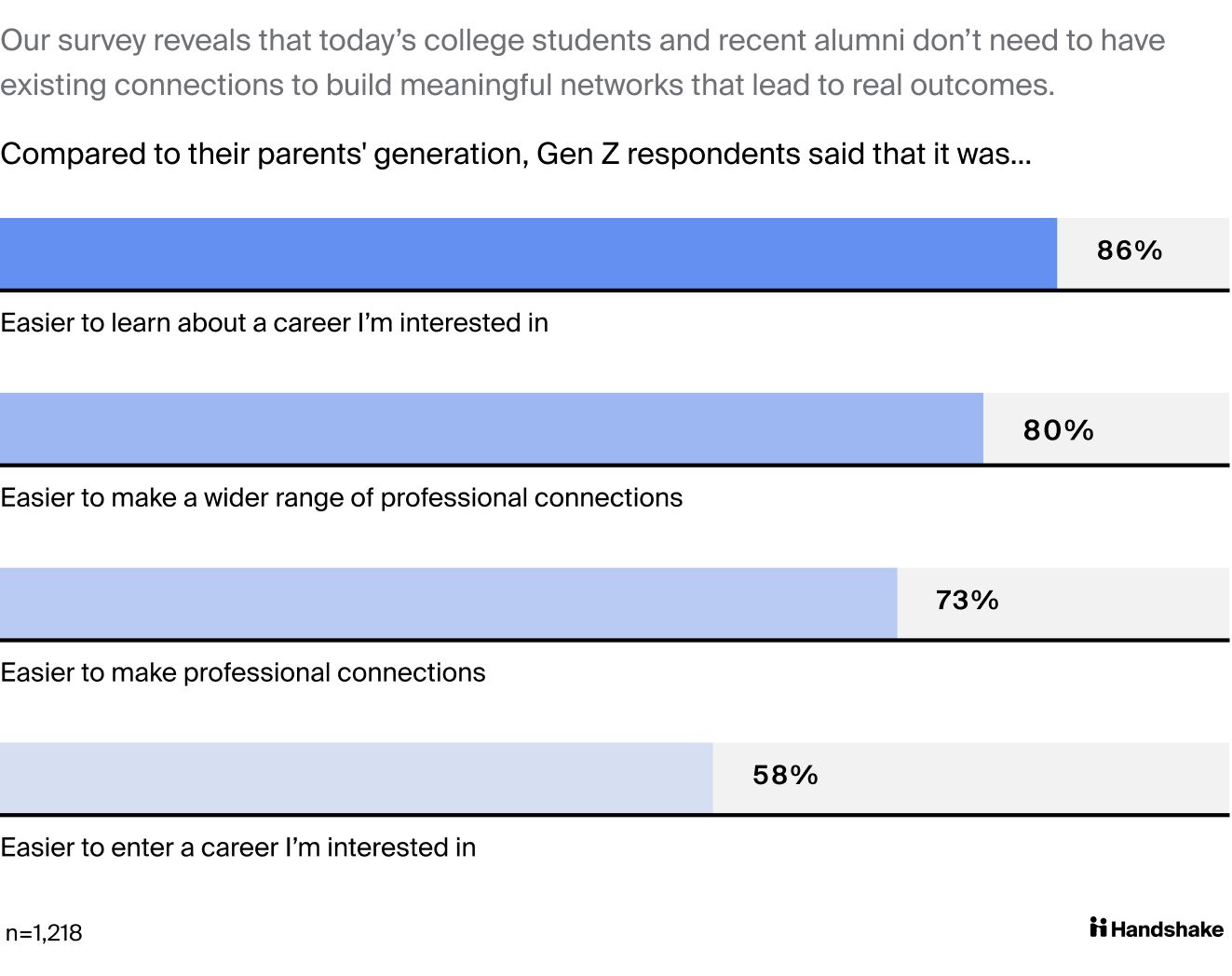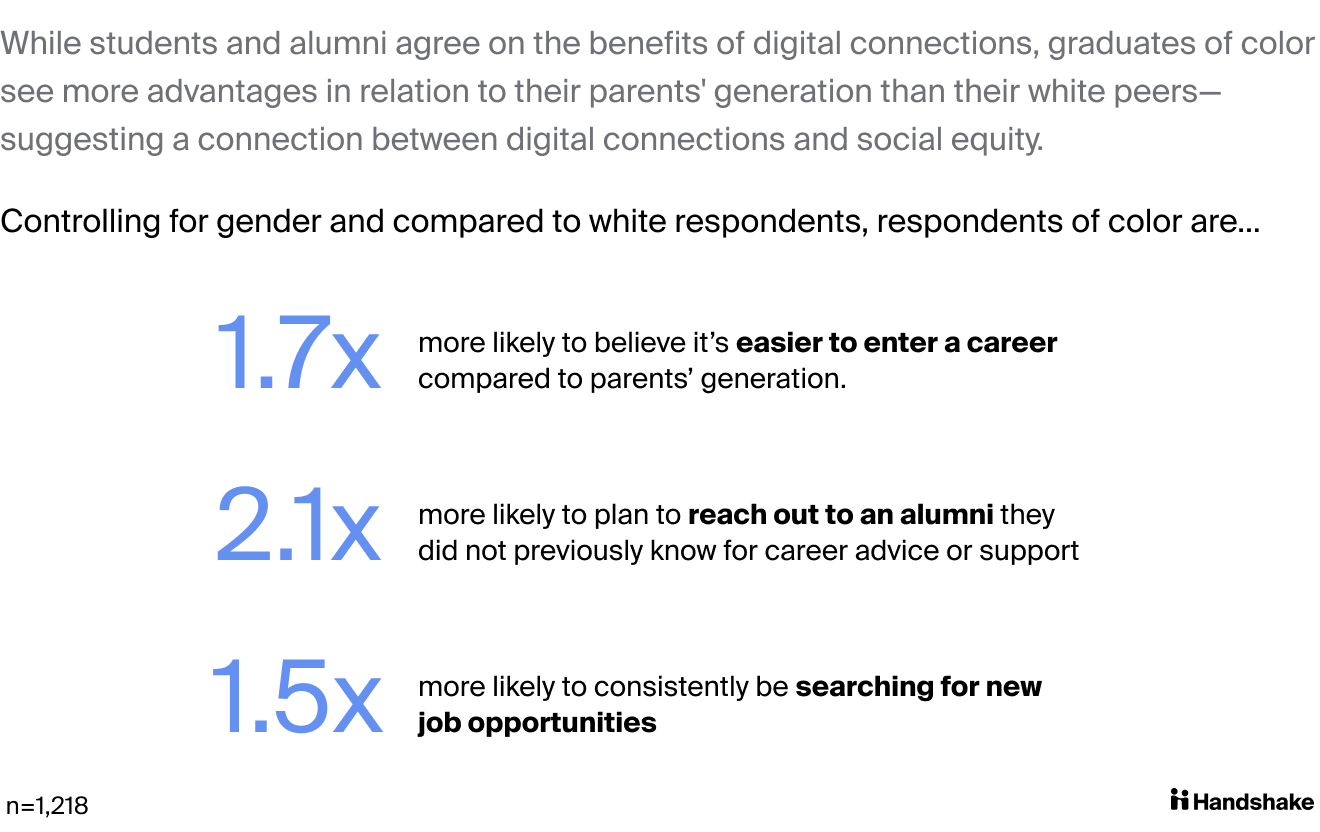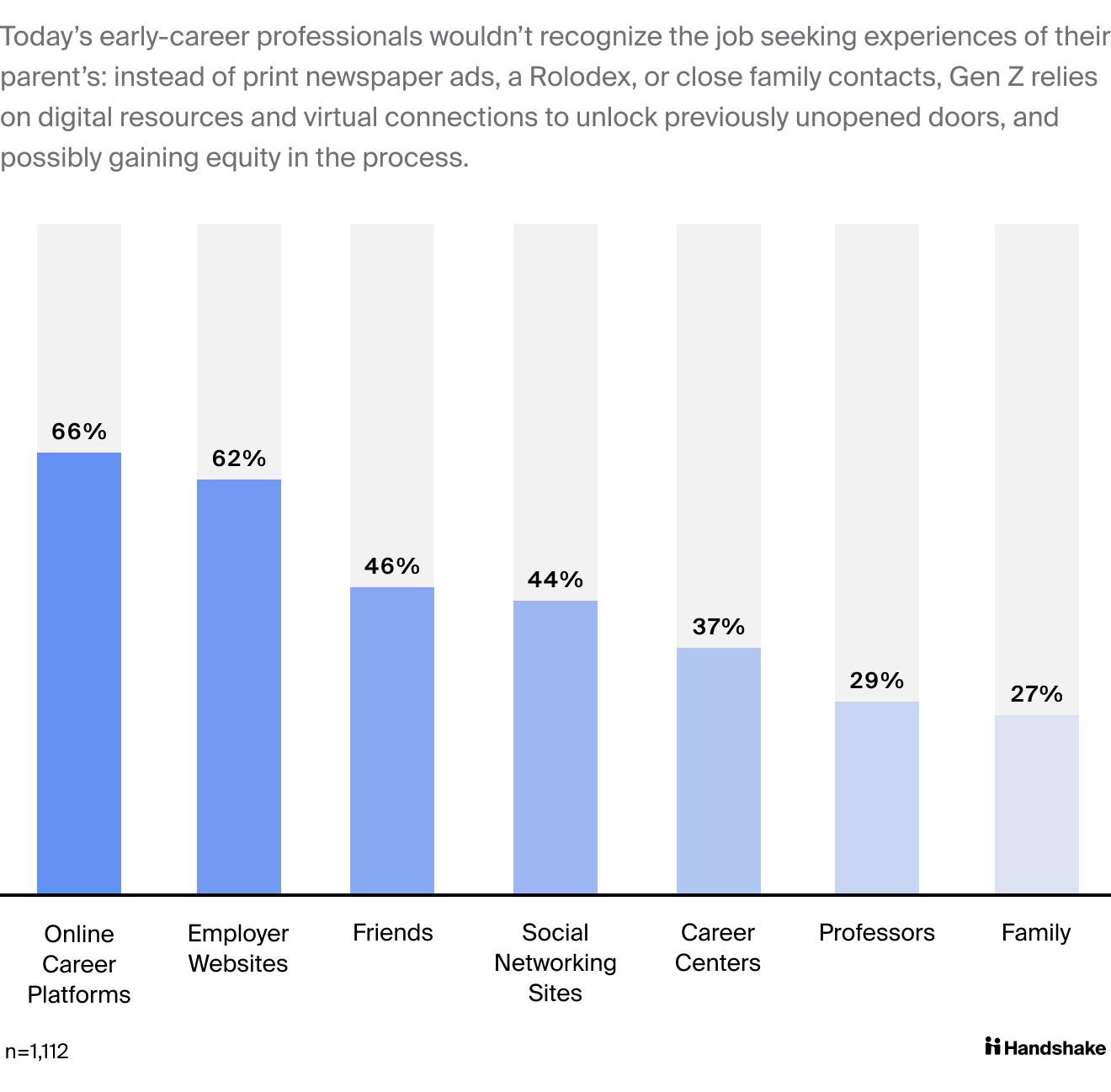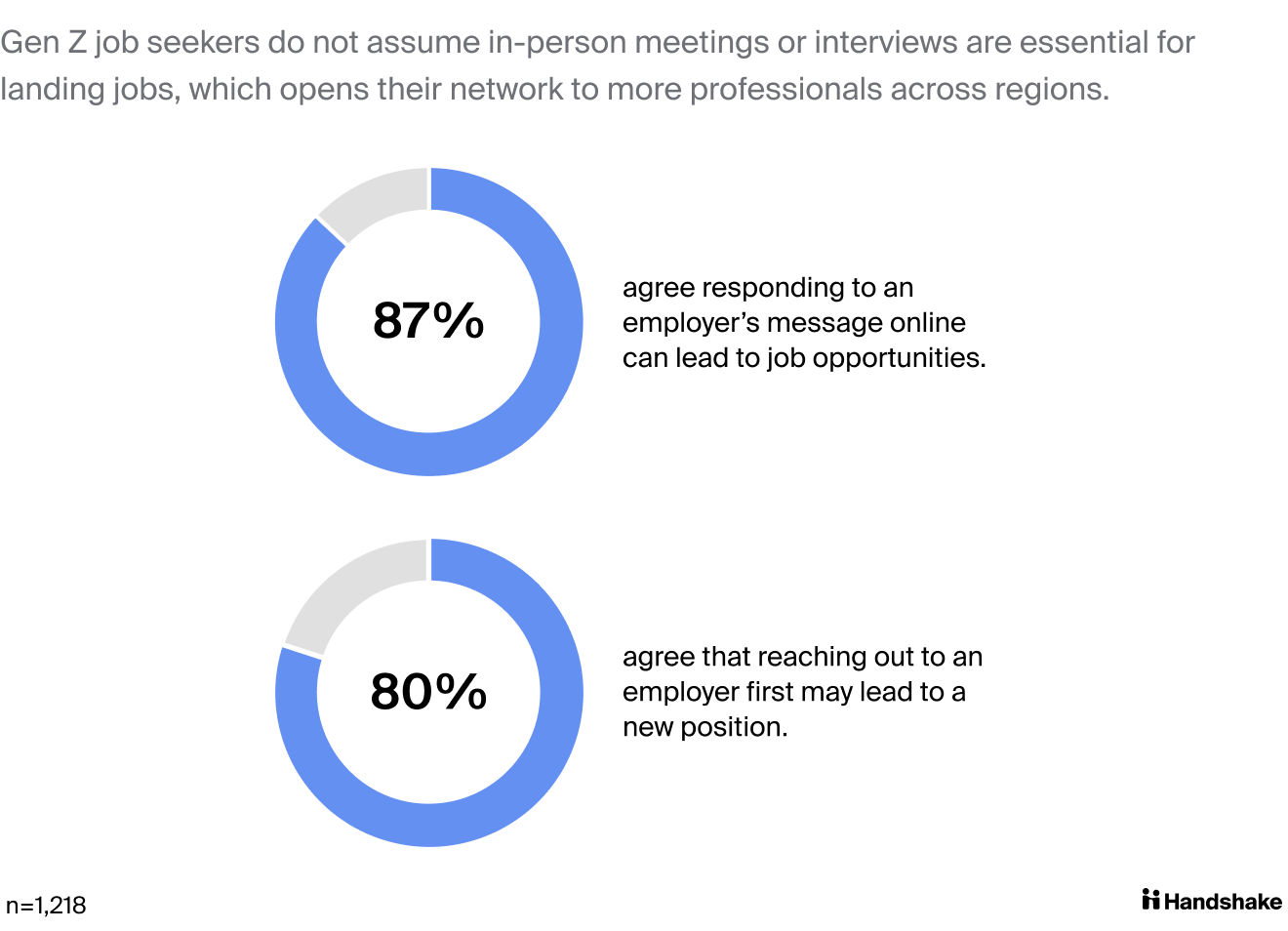
The new currency of social capital
How Gen Z builds relationships and finds jobs
When baby boomers and Gen X were seeking their first jobs, success was directly proportional to who you knew. Whether it was access to a great Rolodex, personal connections, or just the “good old boys” network, an in-person connection built on preexisting social capital was paramount to a seamless college to career transition.
Not so much today—digitally-native Gen Z has more confidence building relationships and creating professional networks online, and from scratch, compared to their parents’ generation. Early-career job seekers are architecting relationships in novel ways, accelerating the pace and scale in which they grow their networks and advance their careers. And for many, the shift to new models of building connections online is far more equitable than in the past, suggesting a democratization of social capital for a new demographic of college graduates.
Key takeaways
- Gen Z is more optimistic about building a career network than their parents because of the digital world. Eighty percent say it’s easier to make professional connections than their parents’ generation.
- Recent graduates of color are even more likely to perceive increased opportunity and equity through digital connections. Respondents of color are 1.7 times as likely to believe it’s easier to enter a career now compared to their parents’ generation.
- Meeting in person? No longer necessary to build a network (according to Gen Z). Sixty-seven percent believe you do not have to meet in person to make a professional connection, with women 26% more likely than men to say so.
- More than 8 in 10 Gen Z job seekers believe that digital connections sparked by messages will lead to a job opportunity. This optimism breeds mobility— about a third of respondents are considering jumping ship in the next six months (a rate that is 2 times higher for Black students and alumni).
- The vast majority are willing to pay it forward. Over 90% would offer to help a younger person they don’t know from their college with career advice.
Wondering how to make sense of these findings for your recruiting or university career services strategy? Download the full report for recommendations.
73% say it’s easier to make professional connections compared to their parents’ generation.

For Gen Z, the internet and social media provide the path to social capital—a wealth of information, resources, and network potential, facilitating access to a richer job pool and catalyzing broader professional networks than their parents. This puts today’s early-career job seekers on a more level playing field, as compared to previous generations who got a leg up based on who they knew, where they went to school, or what zip code they came from.
Student perspectives: Denisha
Denisha is a first-generation college student who sparked her professional network following a single DEI recruiting event. Watch the clip below to learn how Denisha’s networking experience led to more confidence in her job search.
Respondents of color are 1.7 times more likely to believe it’s easier to enter a career now compared to their parents’ generation.

The confidence we see in people of color suggests a stark contrast, and potential democratization, from previous generations where preexisting relationships through a job seeker’s parents, college circle, or social affiliation were the norm.
Student perspectives: Arsh
Arsh attends school in rural Pennsylvania where there are fewer opportunities to make in-person connections. Watch the clip below to learn how Arsh builds relationships digitally to break down geographic barriers.
A majority believe you don’t need to meet in person to forge a professional connection—and women more so than men.

More than ever, this generation is relying on online career platforms (66%) and employer websites (62%) to learn about jobs and career opportunities. In fact, 67% of early-career job seekers believe you do not need to meet in person at all to forge a meaningful connection.
Suggesting an evolution in the “good old boys” club of network building, women are 26% more likely than men to believe that you do not have to meet in person to make a professional connection (when controlling for race and ethnicity).
More than 8 in 10 believe that messaging an employer may lead to a job opportunity.

The trending currency of social capital is digital networking. 87% of alumni believe that responding to an employer’s message online can lead to job opportunities, while 80% think that reaching out to an employer first may lead to a new position.
Tapped into an always-on network of opportunities, it’s no surprise that half of respondents said that they were consistently searching for new job opportunities. Even among those satisfied with their current job, more than a third said that they are constantly searching for new job opportunities. As one respondent noted, “I’m confident in my networking skills. I’m also confident in my research skills, I always look for more information on open positions. Even during COVID-19 I’ve had virtual meetings and calls with professionals.”
92% would offer to help a younger person they don’t know from their college with career advice.
There is desire from graduates to support younger students, even though 15% reported establishing connections with alumni. While alums overwhelmingly want to support other alums, many haven’t received support themselves. Bolstering efforts to nurture professional relationships that cater to Gen Z’s preferences will have lasting impact on attracting talent.
Student perspectives: Hannah
Hannah found her first mentor at a recruiting event. Watch the clip below to get a sense of how Hannah nurtures early-career relationships on Handshake to learn more about her dream role.
Digital networks are well-situated to act on this latent desire from graduates, particularly graduates of color, to support younger students in their early careers. Gen Z is ready to connect and mentor—they just need the avenues to do so.
To dive deeper into how Gen Z is building connections, download the full report.
Methodology
To gain insight into how Gen Z builds relationships digitally, a random sample of Gen Z alumni and upcoming graduates on Handshake were invited to participate in a survey throughout the month of August 2021. Over 1,200 respondents completed the survey, which examined how Gen Z alumni viewed their own experience in their early career, what they believed led to success, and their willingness to support other job seekers in the future.
Data were cleaned and analyzed across gender, race and ethnicity, institution type, and other groupings. Where noted, tests of statistical significance were used to determine the likelihood of a response when controlling for a number of factors.
Learn more
-
-
A drop in tech hiring? Employer demand for TikTok skills? Check out short, bite-sized insights from our network at the Handshake Network Trends blog.
Check out the blog -
Dive deeper into remote working trends and learn which cities are benefiting most from Gen Z’s interest in distributed work.
Read the report